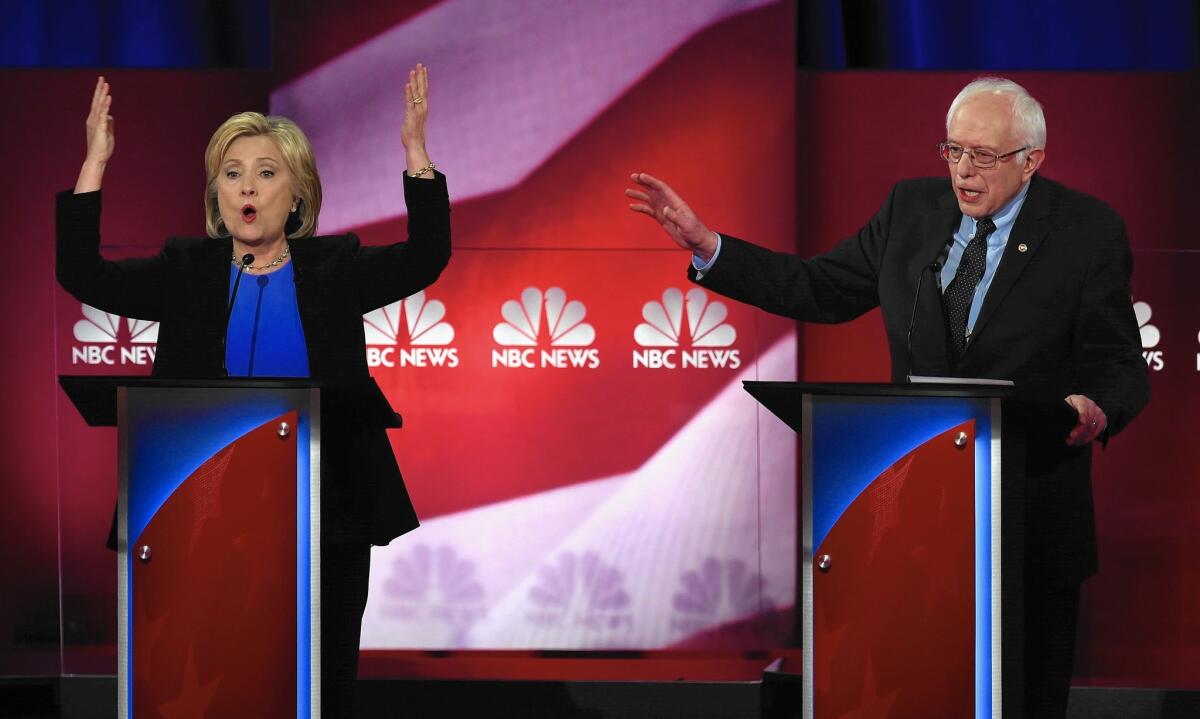Capitol Journal: Why Hillary Clinton and L.A. County supervisors are wrong on gun control

Someone needs to explain to me what benefit would come from repealing the gun industry’s limited immunity from lawsuits.
That’s because Hillary Rodham Clinton isn’t. She probably can’t. There likely isn’t much.
And while we’re at it, perhaps someone also could explain what good it would do to force gun owners to buy insurance.
See more of our top stories on Facebook >>
Clinton has been firing away at presidential rival Bernie Sanders about lawsuit immunity for gun manufacturers and dealers. She’s off target.
The Los Angeles County Board of Supervisors is looking into requiring gun owners to buy insurance for their weapons. That, likewise, seems nonsensical.
There aren’t many gun control proposals I don’t like, as any regular reader knows:
Universal, substantive background checks for guns and ammunition? Yes.
Ban possession of ammo magazines that hold more than 10 rounds? Certainly. But government should be fair and buy back the magazines. A November ballot measure sponsored by Lt. Gov. Gavin Newsom would outlaw those high-capacity devices used in so many mass shootings but offer no buyback.
However, repealing lawsuit immunity and requiring insurance?
One would amount to a full-employment act for lawyers. The other would be merely a market-builder for insurers.
We should be trying to stop the carnage before there are dead bodies all over the floor, not just mopping up afterward. Shootings aren’t headed off by encouraging lawsuits and allowing insurance payouts after the fact.
That said, there is merit in making it easier to sue the few rogue gun dealers who carelessly — maybe even willingly — sell to suspected bad guys. Too many of those suits are dismissed. But going after the manufacturers seems pointless.
Let’s back up.
In 2005, Congress passed and President George W. Bush signed the Protection of Lawful Commerce in Arms Act. It absolves gun makers and dealers of legal liability when crimes are committed with their products.
Both, however, are liable for a defective product or if they’re guilty of criminal misconduct, such as knowingly selling a weapon illegally.
As Clinton keeps pointing out, the National Rifle Assn. called it “the most significant piece of pro-gun legislation [to pass] in 20 years.” That embrace left arguably the worst mark against the act.
Then-New York Sen. Clinton opposed the bill. Sen. Sanders, representing hunting-happy Vermont, voted for it.
Sanders last year had a good explanation: “If somebody has a gun and it falls into the hands of a murderer and the murderer kills somebody with a gun, do you hold the gun manufacturer responsible?
“Not any more than you would hold a hammer company responsible if somebody beats somebody over the head with a hammer.”
If brakes fail on a car, causing a deadly accident, the automaker can be sued. Likewise, if a gun blows up in someone’s hands, the manufacturer can be held liable. But there shouldn’t be a suit just because the gun works as designed and kills.
Sanders has backed off, however. Lately he mostly has been sticking up for the “small mom and pop gun shop” that legally sells a weapon and “should not be held liable if somebody does something terrible with that gun.”
The senator now is supporting an immunity repeal bill cosponsored by Rep. Adam Schiff (D-Burbank).
But Clinton, trying to flank Sanders on the left in the Democratic primaries, cited several instances during Sunday night’s presidential debate when the Vermont senator has voted with the NRA.
One was when Sanders opposed the Brady Bill’s five-day waiting period for handgun purchases. He preferred three days — and was wrong.
Clinton “is very disingenuous,” Sanders said. “I have a D-minus voting record from the NRA.”
One thing Clinton definitely was disingenuous about? This statement: “There is no other industry in America that was given the total pass that the gun makers and dealers were.” As noted above, there is no total pass.
As for forcing gun owners to buy insurance, yes, it’s required for automobiles. But that’s to cover costs of car repairs, property damage and personal injuries after accidents.
If a child accidentally shoots himself because a parent has carelessly left a weapon within reach, really, doesn’t an insurance payout seem slightly sick? What would be the deductible?
When a gunshot victim is rushed to an emergency room, we don’t want the receiving nurse’s first question to be: “Did the shooter have insurance?”
How many gangbangers and murderers are going buy gun insurance? Right. None.
I called Adam Winkler, a UCLA law professor and author of the book “Gunfight: The Battle Over the Right to Bear Arms in America.”
“A gun dealer can be held liable for negligence,” Winkler said. “But it’s very difficult.” Removing the lawsuit immunity, he asserted, could force manufacturers to be more cautious about selling to negligent dealers.
“I don’t think anyone in gun control believes it’s a panacea,” he said. “But it could have an impact.”
And requiring insurance, he continued, could result in policy-issuers encouraging gun owners to keep their weapons secure. But, he added, “99.9% of guns are not used in criminal activity. Requiring insurance for all might be a bit of overkill.”
I asked the professor what would be the most effective way to reduce gun violence.
“Universal background checks,” he answered.
“And take seriously what the NRA says: Enforce laws currently on the books.”
Even the NRA isn’t always wrong.
Twitter: @LATimesSkelton
ALSO
Gov. Jerry Brown is likely to urge caution in his State of the State speech
Kamala Harris should take bolder action on police shootings, civil rights advocates say
Health groups launch California ballot initiative to raise taxes on tobacco, including e-cigarettes
More to Read
Start your day right
Sign up for Essential California for news, features and recommendations from the L.A. Times and beyond in your inbox six days a week.
You may occasionally receive promotional content from the Los Angeles Times.







